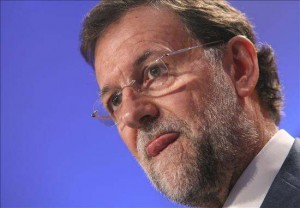
Maybe it’s because of the condensed format, maybe because he was talking to a non-Spanish newspaper, or perhaps he was just in a particularly open mood, but Mariano Rajoy’s interview with the The Washington Post’s Lally Weymouth seemed unusually revealing. The Popular Party leader, now three weeks away from an apparently certain general election victory, was hardly expansive, but some of his answers were relatively bold for a politician who has made hiding his hand something of an art form.
When asked whether he would go beyond Zapatero’s spending cuts, Rajoy is quite forthright:
Yes, there is no other way out. I am in favor of reducing all budget items. But the item I don’t want to reduce is the pension expenditure because it affects the weakest part of society. And I would not like to reduce rights in health and education — the kind of services any Spaniard is entitled to.
Of course, this is not to say that on taking power he won’t introduce cuts in those areas. Just look at the “efficiency” being implemented in the education and health systems in PP-governed regions such as Castilla La Mancha. He also says “I don’t believe we should right away increase taxation” (presumably that’s the interpreter’s poor word order, not his). Again, this promise/aspiration/wish might not be kept, but he is at least saying some things about the Spanish economy that he could be held to in a few months’ time.
Perhaps more interestingly, Rajoy twice harks back to the PP government of José María Aznar (1996-2004) when explaining his own credentials as a future prime minister. On one occasion, he refers to Aznar’s ability to push legislation through Congress without a majority, thus dismissing fears a Rajoy government might lack reformist heft if it also fails to secure a majority. He also mentions the Aznar government’s record on job creation.
Last time we came into power, it was 1996. The unemployment rate at that time was 22 percent. When we left office in 2004, unemployment was under 10 percent, and now it’s back to 21 percent.
Rajoy wasn’t economy minister at the time (in fact he never was, although he was interior minister under Aznar), but he’s talking up the previous PP government as part of his own CV. A couple of years ago this would have been less likely. Rajoy was desperate to escape the long shadow of Aznar, partly to assert his own authority on the party but also because there was still a negative whiff about the final years of the former PM’s government: the autocracy, the arrogance, and, finally, the handling of the 2004 Atocha bombing.
But now the economic crisis overshadows all of that and Rajoy’s priority is to persuade Spaniards he can get them on the path to recovery. Looking back to the mid-nineties as a golden era of strong government and job creation makes perfect sense.
Also noteworthy is Rajoy’s repetition of his belief that ETA’s recent announcement that it is giving up its campaign of violence is good news, despite the many unconvinced voices on the right. Along these lines, Weymouth draws a fascinating statement from Spain’s next prime minister about his determination to occupy the centre ground:
I believe I have been a moderate politician my whole life. What I did recently was to make an effort to show myself as I am — as a moderate politician.
This is perhaps an indication that his highly ambiguous talk of a PP government rolling back the gay marriage reform (abortion reform might be a different matter) has simply been a wink to conservative voters.
And finally, we get a highly unfamiliar view of Rajoy when he is asked about his qualifications as a future prime minister. Forget the image of dithering anti-leader, afraid to take a decision, let alone speak his mind. This is Rajoy as alpha male, a chest-beating silverback of a politician:
In the government, I have held four different ministries and also been deputy prime minister. I have won two internal elections inside my party … Nobody in Spain has my political career. And if I didn’t believe in myself, I couldn’t run for election.
Well, that is quite a piece of deconstructing the interview! Some space for hope, some space for doubt, much uncertainty. The fair amounts, things as they are right now. Good work that should be read alongside the Post.